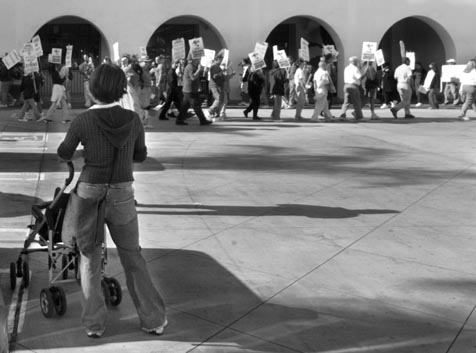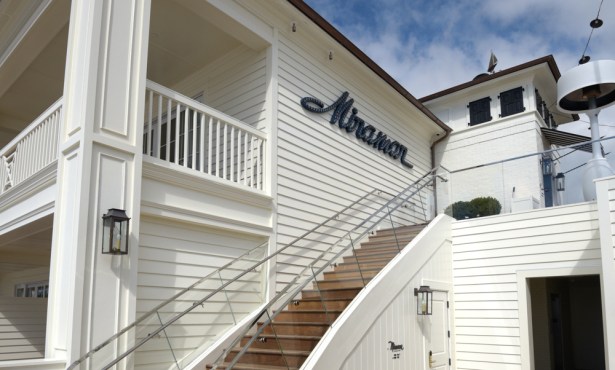Supermarket Battle Lines
Uneasiness Follows Strike Authorization

When he voted thumbs-up on Sunday, June 24, authorizing his union to call a strike anytime with 72 hours notice, it was “an uneasy yes,” said a veteran supermarket worker-call him X-who asked not to be named for fear of retaliation from his employer. Besides dreading a repeat of the 2003 strike and lockout, which lasted for five months, he does not trust either of the two sides now engaged in combat over workers’ wages and benefits. In one corner is the United Food and Commerical Workers Union (UFCW), which is presumbably fighting for his interests in contract negotiations that have dragged on for more than six months. In the other corner are the three corporations that own Vons, Ralphs, and Albertsons stores-Safeway Inc., Kroger, and Supervalu respectively. Caught in between are the workers, including about 1500 employees at 20 supermarkets in Santa Barbara County.
X, who earns $18.90 per hour, has been with Vons for more than a decade and is at the very top of the payscale for supermarket workers. There are workers who earn slightly more, but only those who were fully promoted before the current contract, which was signed in 2004 at the conclusion of the strike, lowered the cap. X has received the same wage for five years, except for bonuses of up to $2,000 annually for which he, as a department head, is eligible, plus the extra dollar per hour re received he was promoted to that position. So when he looked at the markets’ incomplete contract proposal, and saw the blank space where his new top salary should have been written, he rejected it, giving strike authorization. It bothered him, though, to vote on a contract whose terms were only partially revealed. “I feel like we’re seeing what the union is letting us see,” said X.
Ralph’s checker Debbi Muhler said the same thing. “We’re damned either way,” she said. “Do I say to accept this little bit without seeing the rest?” The only other choice was to reject the contract and give the union permission to call them her off of her job and onto the picket lines. It was the same choice made by X and at least two-thirds of their fellow employees.
There is little doubt that the power to call a strike improves the union’s bargaining power, though UFCW spokesperson Mike Shimpock insists that the employees got the same information that the union got. The employees were asked to vote on a partial contract “because the markets couldn’t get a comprehensive proposal together in over six months of negotiations. We gave them an additional two weeks to get an offer together and they didn’t even try: They gave us nothing to show our members. So we were forced to use what was on the table.” The owners have been dragging their heels for months, according to Shimpock. “They show up, they go caucus,” he said. “It’s the civil disobedience, go-limp method of negotiating.”
By contrast, he said, the union got a total contract from Stater Brothers and Gelson’s in a few weeks. Vons, Ralphs, and Albertsons are not fighting to keep their prices competitive, according to Shimpock. Rather, he said, “They are decreasing wages and benefits to increase their already exponential profits.” He noted that Trader Joe’s, with a tiny fraction of the market, manages to start employees at $10 per hour, with full benefits and a pension plan after 90 days.
The stores save millions of dollars each day that a contract is not signed, according to Shimpock. These alleged savings come partly from the difference between the current health plan and the one on the table: The partial proposal shown to employees would start covering new hires and their children after just six months of employment instead of the 12 to 18 months they now wait. Even assuming most of the new contract’s terms are retroactive, the companies are also making bank on interest accruing from those savings in the interim. Of the 44,000 people hired under the current contract, only 3800 have health insurance, while just 80 (“That’s eight oh,” said Shimpock) have healthcare for their children or spouses.
A major sticking point from the union’s standpoint is the companies’ wish to halve their contribution to the health fund. That, according to Shimpock, could bankrupt the system within a few years. Another sticking point is the companies’ aim to further reduce wages, such that it would take new hires 11 years to reach the top of the pay scale, according to the union.
It is “completely false” that the companies are dragging their feet, said Brad Chase, a spokesperson for the three chains. The two-week deadline set by the union was just a pretense to get a strike authorization vote, according to Chase. “At that point,” he said, “they stopped talking substance and would talk words and language only.”
The underwhelming health care coverage statistics are “another media stunt,” said Chase-like the YouTube video campaign called “Supermarket Swindle,” which is being waged by Robert Greenwald, maker of the popular documentary titled “Walmart: The High Cost of Low Price.” Of the source for the health coverage statistics, which came from researchers at the UCLA and UC Berkeley labor centers, Chase said, “We don’t exactly consider them an objective resource. They actually have a union leadership school.” And on the substance of the union’s complaint about the low number of workers receiving the benefits, Chase noted the companies’ willingness not only to start providing health care after six months of employment, but to throw in well-baby services, annual physicals, and mammography. For those who have health care, he pointed out, premiums are low: $40 per month at most, and many pay nothing at all, though he conceded that the majority of workers do not qualify. This is partly due to the rate of turnover, which he said was nonetheless lower than retail generally. Contrary to union claims, the health fund is in no danger of collapse, said Chase, but will remain “solvent throughout the length of the contract and beyond” thanks to $30 million in annual contributions and an existing surplus of $500 million. He noted that skyrocketing health care costs are causing many employers to shy away from offering the benefit. “We are proud of what we offer our employees,” he said.
“I don’t believe either side,” said X. He had done the math on at least one of the unions’ claims about the markets’ offer and found it dubious: According to X’s calculations, it would not take 11 years, as the union claimed, for a typical employee to reach the top of a new pay scale the companies’ proposed for new hires, but eight or nine years. On the other hand, X scoffed at the idea that the companies cannot afford to improve wages, when they collectively raked in $8.3 billion in profits last year, paying their three CEOs a total of $27 million. (Of that, $11 million went to Supervalu CEO Jeffrey Noddle.) Asked whether it is true that employee turnover has increased since pay and benefits were reduced in the last contract negotiations, X shook his head and exhaled noisily. “A lot,” he said. “A supermarket job used to be a career.”



